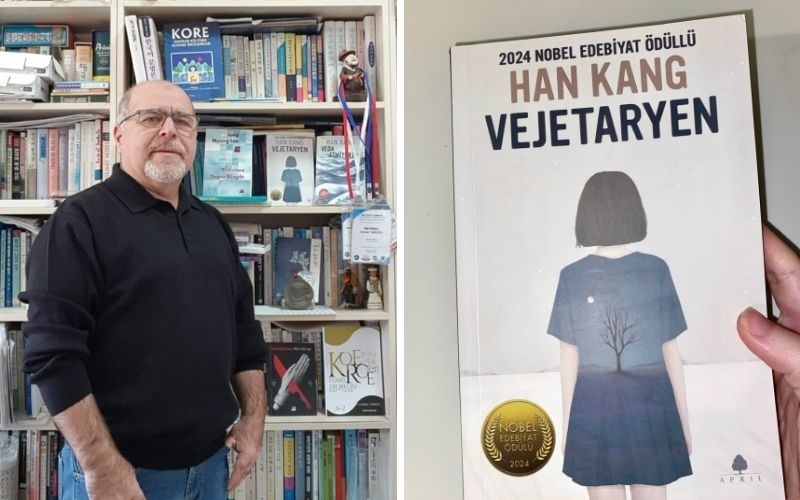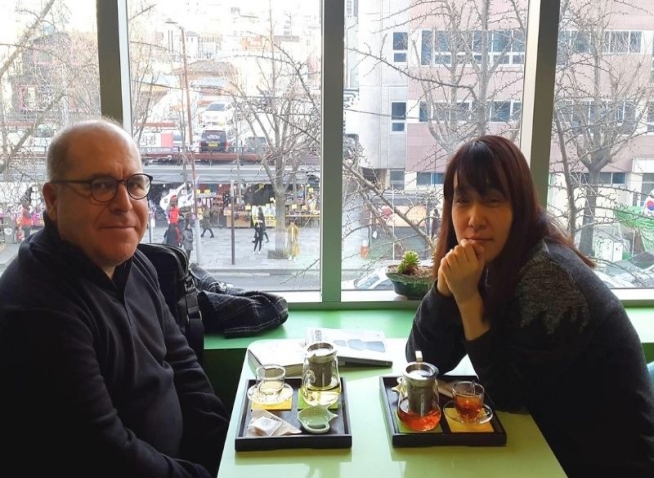- 한국어
- English
- 日本語
- 中文
- العربية
- Español
- Français
- Deutsch
- Pусский
- Tiếng Việt
- Indonesian
By Honorary Reporter Volga Serin Suleymanoglu from Turkiye (Turkey)
Photos = Sirri Goksel Turkozu
Sirri Goksel Turkozu, who translated the Nobel Prize-winning book ''The Vegetarian'' by Han Kang from Korean into Turkish, earned a scholarship from the Korean government and received a master's in Korean-language education at Seoul National University in 1996, followed by a Ph.D. in 2004.
Now chair of the Department of Eastern Languages and Literature at Erciyes University in Kayseri, Turkiye (Turkey), he champions Korean literature through his translations. He won the 2012 Korean Order of Cultural Merit and 2017 Korean Literature Translation Award from the Literature Translation Institute of Korea, the latter for his translation of Ahn Do-hyun's ''The Salmon Who Dared to Leap Higher.''
The following are excerpts from an email interview with the scholar from Dec. 30, 2024, to Jan. 30.

Professor S. Goksel Turkozu translated the acclaimed novel "The Vegetarian" from Korean into Turkish.
How did you grow interested in Korean?
My interest began with the 1988 Seoul Summer Olympics. Growing up, I'd often heard about the Korean War, so I assumed Korea was a poor country. When I watched the Olympics on television, I was amazed to see how modern and developed the country had become. The combination of the Korean War stories I'd heard while growing up and the impression the Seoul Olympics left on me ultimately inspired me to study Korean.
How did you learn the language?
When I first visited Korea, I began reading literary works to improve my Korean. As I read, I noticed many cultural similarities between Turkiye and Korea, which sparked my desire to translate Korean literature into Turkish. After returning home, I began working on this.
Why did you choose to translate Han Kang's works starting with "The Vegetarian?"
The novel was my first encounter with her writing, and it left a profound impact on me. When April Publishing House approached me in 2015 to translate the novel, I hadn't read her work though I was aware of her name. After reading it, I was deeply moved and knew Turkish readers could relate to it on many levels. Translating the book opened the door to discovering more of Han's works, and each deepened my admiration for her ability to tackle societal structures and resist violence in the world.

S. Goksel Turkozu in 2017 meets "The Vegetarian" author Han Kang at a cafe in Seoul.
You met Han in Seoul in 2017. What did both of you discuss?
After translating "The Vegetarian," we met in Seoul. She is a respectful and gentle woman and was invited to Turkiye several times, but couldn’t come due to her busy schedule.
After the book came out, many readers questioned why it wasn't titled "The Vegan." I asked her this and her response was the term wasn't commonly used in Korea while she wrote the book, and Korean had no equivalent for it. At the time, vegan even in Turkiye wasn't widely known or used.
How was translating "The Vegetarian?"
Translating Han's works was a unique experience due to her clear yet profound writing style. Even her simplest sentences carry deep meaning, so capturing that depth wasn't easy. To preserve Han's perspective and emotional tone, I immersed myself in the characters' experiences and tried to see things through their eyes. Sometimes, it took hours or even days just to find the right word or phrase.
What do you find unique about Han's works?
The striking power of her language. Her writing is sometimes intense and even overwhelming for the reader, as she doesn't shy away from discomforting or challenging emotions. She pushes readers to think deeply and empathize with her characters, making the translation process demanding. It wasn't just about finding the right words but also maintaining the emotional weight and authenticity of her characters' journeys.
In literary talks you've attended, what do strikes readers the most about this book?
In the many literary discussions I attended, I was once asked if I liked the main character Yeong-hye, which was such a thought-provoking question. My answer was a definite yes.
Based on my experience, Turkish readers deeply appreciate Han's language. Korean literature was relatively unknown in Turkiye, but it's become significantly more recognized thanks to her. Those who read Han's works have grown curious about other Korean authors. But Korean literature is still not as well known as its Western, Latin or Japanese counterparts. For Korean literature to gain further recognition, more quality translations are needed.
What advice do you have for those interested in translation of Korean literature?
To be a good translator, my humble advice is to read a variety of literary works from different genres and translations from different languages. You also need a solid command of your own language. Finally, a translation is always incomplete if the translator lacks deep and extensive understanding of the target language's culture, history and people.
msjeon22@korea.kr
*This article is written by a Korea.net Honorary Reporter. Our group of Honorary Reporters are from all around the world, and they share with Korea.net their love and passion for all things Korean.